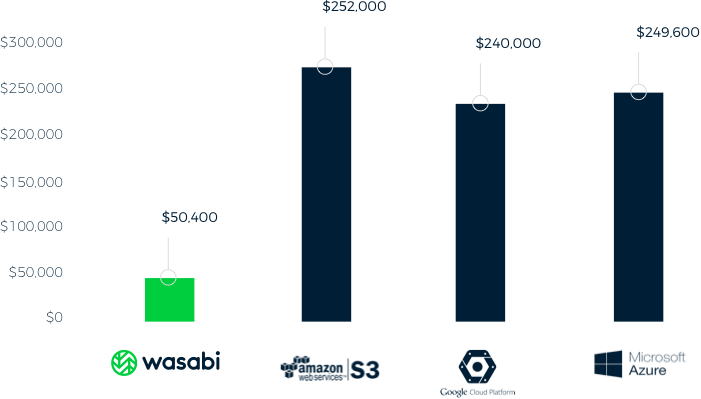UPDATED: Wasabi Technologies Out of Stealth Mode With New Cloud Storage Service Offering
Trying to compete with giants AWS, Google or Azure
By Philippe Nicolas | May 8, 2017 at 2:55 pmWasabi Technologies Inc., as mentioned recently, is the new company founded by serial entrepreneurs David Friend and Jeff Flowers, respectively CEO and CTO, having built together six companies.
The start-up, based in Boston, MA, just out of stealth mode, got $8.5 million from individual investors and has of today less than 20 employees.*
The project is the last iteration of BlueArchive following Storiant a few years ago.
The firm develops and promotes a service and not a product thus playing in the cloud storage space against famous giants such AWS, Google or Azure. These three cloud service providers largely lead the cloud market infrastructure services and AWS by itself represents a $12 billion of revenue annually.
To attract users, Wasabi has to disrupt the market with new compelling arguments and they push a super low cost and a high access speed when you compare with Amazon S3, the market de-facto standard.
The company cuts S3 fee by 5 and boosts speed 6 times. The following table illustrates the gain offered by Wasabi.
According to their respective web sites, Wasabi, AWS S3 and Backblaze B2 pricing is established like this:
| Offering | 1TB | 100TB | 1PB | Comments |
| Wasabi | $50/year | $5,040/year | $50,400/year | Flat fee, $0.0039/GB/month and $0.04/GB for downloads over Internet |
| AWS S3 | $276/year | $27,600/year | $252,000/year | Variable fee with costs for GET, PUT and delete operations |
| Backblaze B2 | $60/year | $6,000/year | $60,000/year | Cost of storage without the cost of monthly trafic |

In term of performance, in under 5 seconds Wasabi retrieves 12.75GB of data and S3 1.97GB with a read test, published by the company, of 1MB files with 10 threads. The TTFB, or Time To First Byte, is less than 15ms.
For durability, Wasabi claims the service offers eleven seconds like S3.
As we understand the service is a storage service and not a compute or other ones, so it is possible to use the cloud storage service with Amazon EC2.
The term used to position the offering is a bit strange as they use ‘Hot Storage’ which is used usually to qualify primary storage dedicated for hot data, meaning data used very frequently by applications. In that case, we understand they target hot data to be stored in the cloud and bypass on-premise storage. It’s pretty funny as we remember that Storiant targeted cold data with many similar technologies.
Few questions to answer :
- What is the availability of the service? The company mentions durability of data but they are two distincts notions. Does the service support multi-geo distributed topologies? A multi-data center model?
- There is no clear indication of scalability except that the service relies on object storage model. It seems that users are let alone and have to trust object storage technologies for scalability.
- Then the adoption question: we understand the fee and speed advantages but why will potential users select Wasabi as the company is very young? Previous companies built by these founders had difficulties or even disappeared? It leaves some doubts on the table.
The good point is about the price this company offers and the price pressure some users can expose to their current cloud providers before moving to Wasabi. But you know what will be the result, not a change to Wasabi but a price alignment by cloud providers without the pain of migration. We saw that in the past… it’s good for users finally as price drops and competition makes differences and shake the industry palm.
* Some information came from the article Friend & Flowers Return With Wasabi, Take on Amazon in ‘Hot Storage‘














 Subscribe to our free daily newsletter
Subscribe to our free daily newsletter


